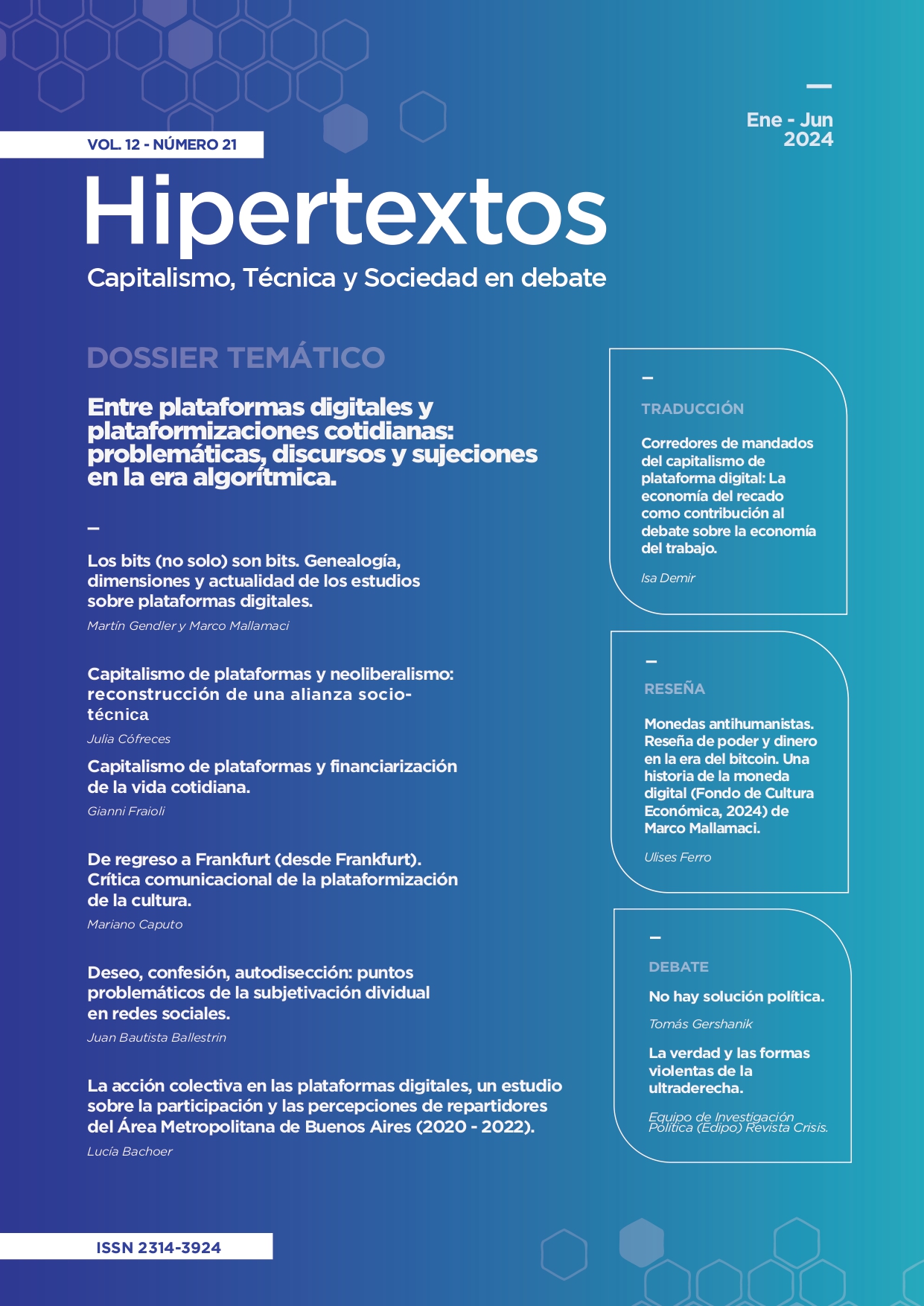Platform capitalism and the financialization of everyday life
DOI:
https://doi.org/10.24215/23143924e081Keywords:
Platforms, data, internet, propertyAbstract
The following work intends to make a theoretical and critical contribution to ongoing debates on the generation and management of digital data. One of the main proposals for its administration lies in the implementation of a free data market. The article aims to investigate its consequences, which would culminate in the progressive commodification of areas outside the market as well as furthering the financialization of everyday life characteristic of neoliberalism. The paper is composed of three sections: the first section delves into a characterization of digital platforms where data is generated; the second reconstructs the main stances of the position advocating for its commodification; the third unravels the consequences that follow from this proposal.
Downloads
References
Agre, P. (1994). Surveillance and capture. Two Models of Privacy [Vigilancia y captura. Dos modelos de privacidad]. Information Society, 10(2), 101-127.
Anderson, C. (23 de junio 2008). The end of theory: the data deluge makes the scientific method obsolete. Wired magazine. https://www.wired.com/2008/06/pb-theory/
Angwin, J., Larson, J., Mattu, S. y Kirchner, L. (23 de mayo de 2016). Machine bias: there’s software used across the country to predict future criminals and it’s biased against blacks. Propublica. https://www.propublica.org/article/machine-bias-risk-assessments-in-criminal-sentencing.
Arthur, WB. (1996). Increasing returns and the new world of business. Harvard Business Review, 74 (4), 100-109.
Bénabou, R. y Tirole, J. (2003). Intrinsic and extrinsic motivation motivation. The Review of Economic Studies, 70 (3), 489-520
Benanav, A. (2020). Automation and the future of work. Verso.
Bostrom, N. (2014). Superintelligence. Oxford university press.
Brynjolfsson, E. y McAfee, A. (2014), The second machine age: Work, progress, and prosperity in a time of brilliant technologies. WW Norton & Company.
Brynjolfsson, E., Avinash, C. y Eggers F. (2019). Using massive online choice experiments to measure changes in well-being. PNAS, 116 (15), 7250-7255. https://doi.org/10.1073/pnas.1815663116
Chun, W. (2016). Updating to remain the same: Habitual new media. MIT press.
Dean, J. (2022). A Golden decade of deep learning: computing systems & applications. Dædalus, the Journal of the American Academy of Arts & Sciences, 151(2). https://doi.org/10.1162/daed_a_01900
Dyer-Witheford, N., Kjøsen, A. M. y Steinhoff, J. (2019). Inhuman power. Artificial intelligence and the future of capitalism. Pluto press.
Durand, C. (2021). Tecnofeudalismo. La cebra.
Fraioli, G. (2023). Regímenes de propiedad posibles para los datos digitales. Desde El Sur, 15(3), e0046. https://doi.org/10.21142/DES-1503-2023-0046
Foucault, M. (2023). Nacimiento de la biopolítica. Curso en el Collège de France (1978-1979) (Trad. H. Pons). Fondo de Cultura Económica. (Trabajo original publicado en 2004)
Gago, V. (2014). La razón neoliberal. Tinta Limón.
Gawer, I. y Srnicek, N. (2021). Online platforms: economic and societal effects. Panel for the future of science and technology (STOA), European Parliament. https://www.europarl.europa.eu/stoa/en/document/EPRS_STU(2021)656336
Gendler, M. (2023). De la cibernética al metaverso: una genealogía de características, transparencias y opacidades algorítmicas. Disparidades. Revista de Antropología, 78 (1), e001b. https://doi.org/10.3989/dra.2023.001b
Google. (s. f.). ¿Qué es Privacy Sandbox? Recuperado el 27 de mayo de 2024 de https://developers.google.com/privacy-sandbox/overview?hl=es-419
Huws, U. (2020). Reinventing the welfare state: digital platforms and public policies. Pluto Press.
Joque, J. (2022). Revolutionary mathematics: artificial intelligence, statistics, and the logic of capitalism [Matemáticas revolucionarias: Inteligencia artificial, estadísticas y la lógica del capitalismo]. Verso.
Katz, M. L. y Shapiro, C. (1985). Network externalities, competition and compatibility. The American Economic Review, 75 (3), 424-440.
Katz, M. L. y Shapiro, C. (1994). Systems competition and network effects. Journal of Economic Perspectives, 8 (2), 93-115.
Kopetz, H. (Ed.). (2011). Real-time systems: design principles for distributed embedded applications. Springer.
Kurzweil, R. (2006). The singularity is near: when humans transcend biology. Penguin Group.
Lanier, J. (2013). Who owns the future? Simon & Schuster.
Lapavitsas, C. (2009). Financialised capitalism: crisis and financial expropriation. Historical materialism, 17 (2), 114-148. https://doi.org/10.1163/156920609X436153
Lazzarato, M. (2013). La fábrica del hombre endeudado. Ensayo sobre la condición neoliberal. Amorrortu.
Macpherson, C.B. (2005). Teoría política del individualismo posesivo. Editorial Trotta.
Marazzi, C. (2014). Capital y lenguaje. Tinta Limón.
Mauss, M. (2009). Ensayo sobre el don. Forma y función del intercambio en las sociedades arcaicas. Katz Editores.
Morozov, E. (2015). Socializad los centros de datos. New Left Review, 91, 47-70.
Nunes, R. (2022). Nem vertical nem horizontal – Uma teoria da organização política. Ubu Editora.
O’Neil, C. (2016). Weapons of math destruction: how Big Data increases inequality and threatens democracy. Crown Publishers.
O’Reilly, T. (2007). What is Web 2.0: design patterns and business models for the next generation of software. International Journal of Digital Economics, (65), 17-37.
Pentland, A. (2009). Reality mining of mobile communications: toward a new deal on data. En S. Dutta e I. Mia (Ed.), The global information technology report 2008-2009 (pp. 75-80). World Economic Forum.
Polanyi, K. (2001). The great transformation: The political and economic origins of our time. Beacon Press.
Posner, E. A. y Weyl, E. G. (2018). Radical markets: uprooting capitalism and democracy for a just society. Princeton University Press.
Prodnik, J. A., Monti, C., Perrone, I., Cafassi, E. y Yansen, G. (2022). La lógica algorítmica del capitalismo digital. Hipertextos, 10(18), e055. https://doi.org/10.24215/23143924e055
Rifkin, J. (2014). La sociedad de coste marginal cero. El internet de las cosas, el procomún colaborativo y el eclipse del capitalismo. Paidos ibérica.
Rochet, J.-C. y Tirole, J. (2003). Platform competition in two-sided markets. Journal of the European Economic Association, 1(4), 990–1029. http://dx.doi.org/10.1162/154247603322493212
Rouvroy, A. y Berns, T. (2016). Gubernamentalidad algorítmica y perspectivas de emancipación: ¿La disparidad como condición de individuación a través de la relación? AGENDA Filosófica, (1), 88-116.
Scholz, T. (Ed.). (2013). Digital labor. The internet as playground and factory. Routledge.
Sibilia, P. (2008). La intimidad como espectáculo. Fondo de Cultura Económica
Srnicek, N. (2018). Capitalismo de plataformas. Caja Negra Editora.
Terranova, T. (2024). Dopo internet. Le reti digitali tra capitale e comune. Nero Editions.
Tirole, J. (2018). Economics for the common good. Princeton University Press.
Varoufakis, Y. (2023). Technofeudalism: what killed capitalism. Melville House Publishing.
VV.AA. (2018). Owning my own personal data. Generation libre.
Wark, M. (2021). El capitalismo ha muerto. El ascenso de la clase vectorialista. Holobionte Ediciones.
Weber, M. (1985). Sobre la teoría de las ciencias sociales. Editorial Planeta-De Agostini.
Zuboff, S. (2015). Big other: surveillance capitalism and the prospects of an information civilization. Journal of Information Technology, (30), 75-89. https://doi.org/10.1057/jit.2015.5
Zukerfeld, M. y Yansen, G. (2021). Plataformas. Una introducción: la cosa, el caos, humanos y flujos. Redes. Revista de Estudios Sociales de la Ciencia y la Tecnología, 27(53). https://doi.org/10.48160/18517072re53.167
Downloads
Published
How to Cite
Issue
Section
License

This work is licensed under a Creative Commons Attribution-NonCommercial-NoDerivatives 4.0 International License.

























